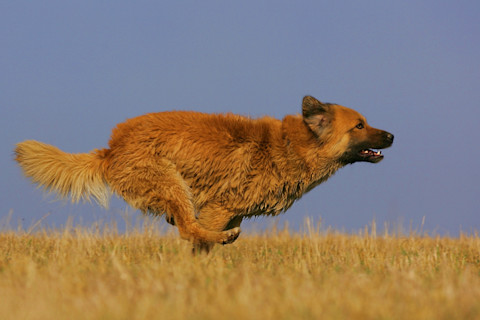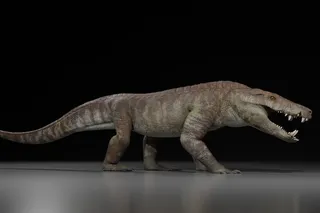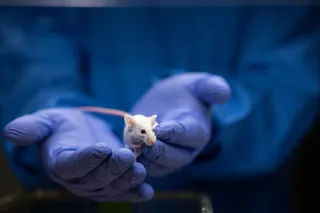From the first time a curious wolf approached fearful humans and managed to befriend them, dogs have been a big part of the human experience. For over 15,000 years, they’ve been our co-workers and companions. Since then, we've learned a lot about dogs and our relationship to them (as you'll learn if you watch Inside the Mind of a Dog, a new documentary on Netflix that includes research based on citizen science contributions). And yet there’s still so much we don’t know about them! To celebrate the Dog Days of Summer, try some of these dog-centric citizen science projects with your canine buddy. And, for your feline friends, we include a couple of cat projects, too!
A whole pack of slobber-worthy dog projects

Fetching is just one of the behaviors under investigation at the Family Dog Project at Eötvös Loránd University in Budapest (Credit: Superbelfrzy RP, public domain via Flickr Creative Commons)
Superbelfrzy RP, public domain via Flickr Creative Commons
This team at the Eötvös Loránd University in Budapest has totally gone to the dogs, with a half dozen different dog related citizen science projects currently running within their Family Dog Project. There’s one on how dogs age, one on how they react to different sounds, and even one for genius dogs who know hundreds of different words. The project was founded in 1994 to study the behavioral and cognitive aspects of the dog-human relationship, and they now claim to be the largest dog research group in the world.
How does your dog compare to others?

How does your dog handle temptation? Loud noises? Being left alone? Fill out the C-BARQ survey to add your dog's traits to a large database and get a report back detailing how your dog compares to others of the same breed. (Credit: Freestocks.org, public domain via Flickr Creative Commons)
Freestocks.org, public domain via Flickr Creative Commons
The C-BARQ (Canine Behavioral Assessment and Research Questionnaire) is a survey covering how your dog behaves in a variety of situations, along with your dog's personality and problem traits, like sampling your food, burying your car keys and making crank phone calls to the vet. Not only will you be contributing valuable information to a dataset used by hundreds of researchers, but you’ll also get back a report on your dog and how it compares to other dogs of the same breed and age. There’s also a survey for cat owners called Fe-BARQ!
Doggy DNA Collection

What secrets are locked inside your dog's DNA? With Darwin's Ark, you can find out! (Credit: Áron Pruzsina, public domain via Flickr Creative Commons).
Áron Pruzsina, public domain via Flickr Creative Commons
As with C-BARQ, Darwin’s Ark asks you to complete a survey about your dog’s behavior. But for a fee, you can also submit a small amount of DNA from your dog– your dog won’t even miss it– and will then send you a report with genetic and ancestry information about your pet. That information also gets stored in a large database, for use by researchers all over the world.
Send your dog ('s data) to Harvard!

Has your dog had an easy, carefree life? Or one full of challenges? The Dog Life Experience project looks into how a dog's past affects its personality. (Credit: Lo, public domain via Flickr Creative Commons)
Lo, public domain via Flickr Creative Commons
Harvard researchers want to know how life experiences affect a dog’s behavior. Do traumatic experiences have profound effects? Do frequent changes of environment? The Dog Life Experience Study is in the first of three phases, with dog owners filling in a short online survey. The researchers are particularly interested in dogs that have some history of adversity or that are unusually fearful or otherwise reactive, but also need to hear about a variety of dogs with different experiences.
How do dogs age?

Why do dogs age in "dog years?" What are the causes of poor health in senior dogs? You can help answer these questions and more by participating in The Dog Aging Project. (Credit: choco@Nerima, public domain via Flicker Creative Commons).
choco@Nerima, public domain via Flicker Creative Commons
How do dogs age, and what can be done to help them live longer, healthier lives? That’s the aim of The Dog Aging Project, a collaboration between over 14 universities, including Texas A&M, University of Washington and Tufts University. To participate, just sign up and complete a survey. There is also a clinical trial studying the effects of the drug rapamycin on aging. The requirements for participating are available at the project website.
Help protect Doberman health

Sharing information about your doberman with the Doberman Diversity Project will help researchers discover, prevent and treat doberman health issues.
Like many dog breeds, the Doberman suffers from a variety of ailments due to inbreeding. The Doberman Diversity Project is compiling a comprehensive database of Doberman DNA, trying to find and understand genetic associations with diseases. As with Darwin’s Ark, participating in the study requires purchase of a DNA kit, and you will receive a detailed report about your dog. Your Doberman doesn’t need to be purebred to participate.
Does your cat fetch?

Many cats think they're too cool to fetch, but perhaps you have a rare fetching feline? If so, you should pounce on the Fetching Cats project while its still active! (Credit: AlmightyWorm, public domain via Flickr Creative Commons).
AlmightyWorm, public domain via Flickr Creative Commons
If you’re wondering why there are no Cat Days of Summer, you’re not alone! Maybe because cats are naturally cool? In any case, the Fetching Cats project will be running for only the next two months or so, through September, so if you have a cat that likes to fetch, please trot on over to the Fetching Cats project page and let them know all about it. You’ll answer a few surveys and submit videos of your cat’s fetching activity. The goal is to learn about feline social communication and play behavior.
And now, a dog's perspective

One dog takes time to share a heartfelt appreciation for the humans that dogs so successfully domesticated thousands of years ago. (Credit: Glamorous Dog Lens, SnapChat)
Glamorous Dog Lens, SnapChat
The domestication of wild humans thousands of years ago enables dogs today to live a life leisure. In this video a grateful dog shares some words of appreciation for loyal humans everywhere.
Even more canine content

In this encore episode of SciStarter LIVE, hear from dog researcher James Serpell as he shares information about his C-BARQ canine survey and how you and your dog can get involved (Credit: SciStarter)
SciStarter
C-BARQ is an online survey you can take with your dog. To learn more about it from lead researcher James Serpell, check out this encore presentation of SciStarter LIVE.














